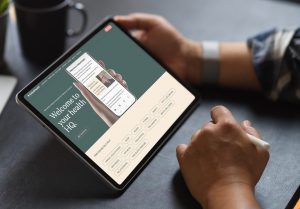The way we deliver healthcare in the UK has to change, says Dr Michael Stein, CEO of Added Health. He explains how advances in medical research and digital technology might now transform the lives of millions and save the NHS £billions.
The NHS is a powerful force for good. It has been brilliant, and highly efficient, at delivering care when we fall seriously ill. But the COVID pandemic has made plain a huge problem. It can be equally poor at stopping us from getting ill in the first place.
This has contributed to the pandemic tipping the UK further into a health crisis. By the start of 2023, there were more than seven million people waiting for NHS treatment. Millions more people have been left suffering chronic physical and mental health conditions.
The adage ‘prevention is better can cure’ has never been more true. At Added Health, we call it ‘pre-emptive health’ – tackling behaviours before they impact on long-term health and life chances.
Added Health is an app that, uniquely, provides comprehensive care and support across five pillars of health and wellbeing – nutrition, exercise, sleep, wellbeing, and relationships.
We call it your Health HQ in your pocket. We are also the first personal health and wellness app to be CQC-regulated for screening and diagnostic services.
Based in Oxford, our aim is to provide our clients with long-term, affordable, tailored and research-based support, so they can live healthier, happier and longer active lives.
It is what the government wants, too. A 2019 Green Paper describes the need for a ‘national preventative healthcare strategy based on proactive, predictive and personalised prevention’.
Such a strategy will need to make full use of latest digital technologies to be adopted by patients and be scalable. It will need innovative thinking, from outside the NHS.
It will need to be low-cost, and use proven behaviour change techniques to drive results. And it will have to be evidence-based and comprehensive in its scope, to meet all needs.
That is precisely what Added Health aims to deliver.
Global brains trust
I co-founded Added Health in 2020 after witnessing the devastation caused by hidden poor health at first-hand. A brilliant NHS physician – a close friend and a former colleague – died suddenly in his 50s.
He had not known he had severe heart disease and suffered a massive heart attack. I was shocked that a leading doctor could be taken from us this way. How, I asked, can we stop this happening?
The answer is Added Health. I have developed the concept with co-founder Professor Chris Butler. Chris is Professor of Primary Care at Oxford University and Director of the university’s clinical trials unit.
He is also co-Chief Investigator of PANORAMIC, the on-going trials platform that assesses the efficacy of new COVID therapies.
From the beginning, we have wanted science and evidence to be at the heart of this new service. For example, Added Health draws on latest research showing how our physiological and nervous systems are interconnected.
Crucially, the service is delivered by caring, well trained coaches (guides) supported by technology, in that order. To be truly effective, technology must be used to enhance the human relationships essential to good health practice.
We are also building a global brains trust, drawing together experts like Microsoft’s Worldwide General Manager of Health, Neil Jordan, and Mayo Clinic cardiologist Charles Cannan, to help guide Added Health’s development.
Motivating change
So, how does Added Health work?
A client who signs up for our service completes a detailed questionnaire about their health and lifestyle. This is reviewed by a qualified doctor to identify if specific medical interventions may be needed.
Our client then has a consultation with a qualified and experienced coach to establish their goals. It may be to lose weight, or to improve sleep, or to address a chronic condition, such as diabetes.
Every coach is trained to use Motivational Interviewing (MI). This is a behaviour change technique – proven by many peer-reviewed studies, and used widely in the NHS – to enhance motivation and achieve goals.
MI was developed by psychologists Professor Steve Rollnick and Professor William Miller, and Chris Butler. Steve Rollnick is Added Health’s Head Coach and a member of our advisory board.
Based on insights from the questionnaire, guidance from Added Health doctors, and the consultation, the coach then draws up a personal plan, which is reviewed and agreed by the client.
Each plan’s implementation is supported with regular communication through text messaging and delivery of tailored content. This can include fitness plans, recipes for healthy meals, and behaviour change encouragement.
We’re developing content for specific issues, for example, weight loss, gut reset, gout, and – coming soon – menopause. Clients can also have further face-to-face consultations, if necessary.
Digital innovation
Central to this approach is the use of machine learning to best use the huge and ever-growing pool of anonymised health and lifestyle data we’re gathering.
Making clients feel their needs are met is critical to their progress. However, over time, more shaping of personal plans can be achieved using this responsive software, monitored by our doctors and coaches.
Tellingly, as long as there is an existing relationship established by an initial consultation, we have found delivering support through texting does not diminish its impact. Meanwhile, machine learning will allow us to drive continuous improvement, and deliver services at scale, at lower cost.
We have been accepting clients for less than 12 months. But early results are very encouraging. Take Simon, aged 50:
“Within six weeks, my cholesterol, blood pressure and urates were down, and I lost 7kg. I felt energetic and mentally sharper. The osteoarthritis in my hips was improved.
“So, I came off meds for cholesterol and gout because it’s under control naturally. By 12 weeks, I had lost 10kg, my waist was 2″ less and I remain off all meds still.”
Simon’s experience reflects Added Health’s enormous potential: chronic conditions eased, even eliminated; wellbeing and life chances improved; NHS costs reduced; all achieved with minimal input from hard-pressed GPs.
Business health
 A key area where we think we can make a real difference is in helping employers. They are increasingly anxious about the impact of poor health on their organisations, exacerbated by the COVID pandemic.
A key area where we think we can make a real difference is in helping employers. They are increasingly anxious about the impact of poor health on their organisations, exacerbated by the COVID pandemic.
Research shows employees feeling below par can cost a business, on average, a lost month of productivity every year. Around 30% of employees have a chronic medical condition.
A survey of UK employers showed how between 2021 and 2022, absences increased 29% and ‘presenteeism’ by 18%. The number of people intending to leave their jobs increased to 41%.
In a 2021 study, McKinsey found effectively treating depression and anxiety could lead to a 4:1 financial return on investment in terms of improved employee health and productivity.
We want to work with employers to address these issues and realise the advantages that will follow. We can develop a programme bespoke to their needs, based on workforce profile and activity.
That rich pool of anonymised data can be used to understand an organisation’s health at a granular level to design a programme with specific objectives, for example to improve workforce happiness, productivity or employee retention.
Based on our results, key members of staff, who may be considering retiring early or reducing their hours because of debilitating chronic conditions, can get a new lease of life, with renewed energy and purpose that benefits both them and their employers.
Profound impact
We’re putting these concepts to the test with an imminent Added Health study with a group of employees at Oxford University. Another study will start soon with a cohort of primary care patients.
As a scientist, I want to see the results. But I am confident they will confirm this medically-led, coach-implemented, and technology-enhanced approach to pre-emptive health could profoundly improve personal health and NHS finances, if widely adopted.
The urgent need for change is now. What is exciting is we now have the know-how and the technology to make that change happen.
Dr Michael Stein MB ChB, BSc (hons) (UCT), D Phil (Oxon) is a health entrepreneur who has been developing new ways to deliver healthcare for more than 25 years. He also practised medicine in the NHS and carried out research and lectures in immunology and pathology at Oxford University.








Recent Comments